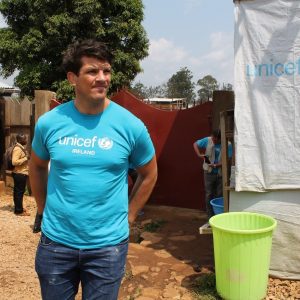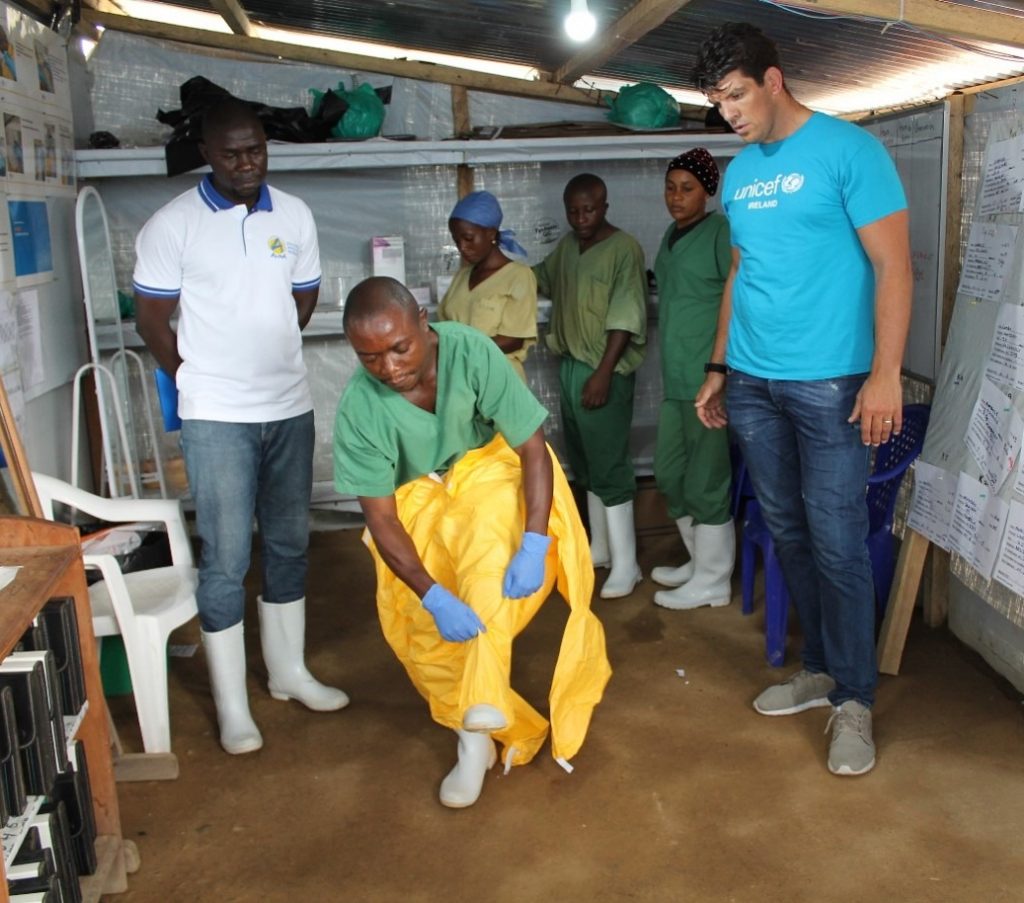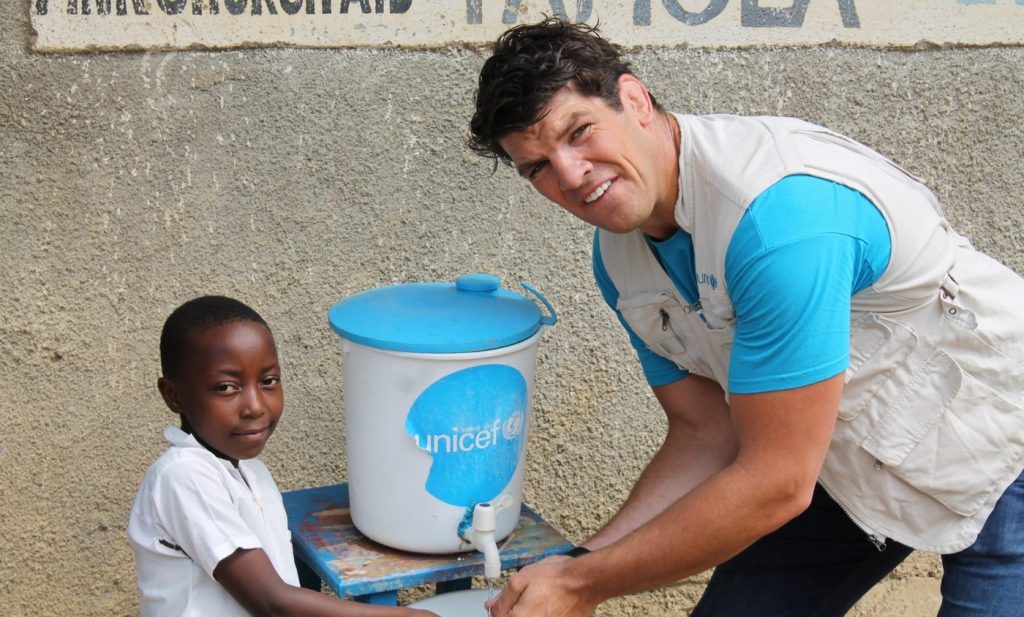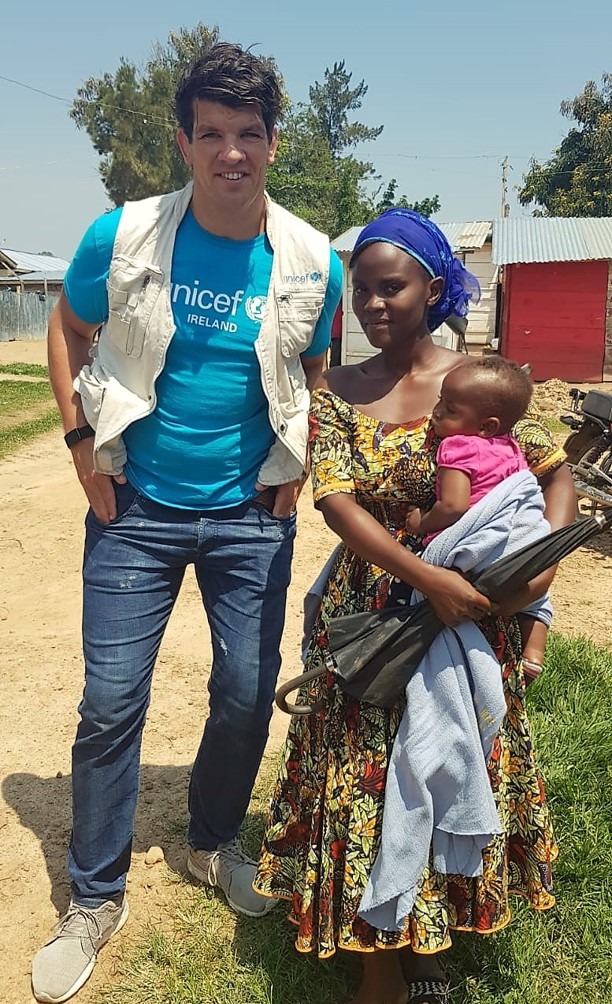
By Donncha O’Callaghan, UNICEF Ireland Ambassador
Nearly two years ago a deadly Ebola outbreak hit the Democratic Republic of Congo (DRC). So far, this epidemic has claimed over 2,000 lives, and infected 975 children.
Last Sunday, April 12th, an official announcement was expected to declare the terrifying outbreak finally over. The country had gone over 6 weeks without a case, and amid the COVID-19 pandemic, this would have been a moment for us all to truly celebrate.
But sadly, over the weekend, devastating news came through of the death of a 26-year old man due to Ebola in Beni, eastern DRC.
After two years of painstaking work to rid the DRC of the Ebola epidemic – this was truly tragic news.
In June 2019, at the near height of the crisis, I visited the DRC with UNICEF. As a proud UNICEF Ambassador, I have been on several overseas trips visiting humanitarian emergencies around the world. But nothing prepared me for what I saw in the DRC.
This was the second-largest Ebola outbreak in history. A third of people infected were children. Just after we landed, we heard of the first case in neighbouring Uganda. Health workers were seeing a near 70% fatality rate, and there was real concern how far it could spread.
But it didn’t spread.
Almost from that day, the virus has been in retreat.
A united force of local DRC health workers and international teams, from the likes of UNICEF and the WHO, have fought it back. They’ve been relentless – in some of the most difficult conditions you can imagine. Continually finding new ways to push back and encircle the visible enemy.
And even this weekend, after the latest case, UNICEF teams returned to work, supporting teams conducting decontamination of the man’s home and continuing to work closely with the health authorities and partners to provide support to the affected families and their children.
Ebola’s reemergence is a real setback for everyone in the DRC. But we must remain positive. The response teams have learned so many lessons that will be key in the DRC against Ebola, as well as around the world in the fight against COVID-19.

Accurate information is key
Sadly, we’ve all seen how misinformation can be deadly when an outbreak strikes. As with COVID-19, all sorts of rumours and ‘fake news’ were spread about Ebola in the DRC.
Ebola spreads through bodily fluids and primarily through person to person contact. Thankfully, it’s not as infectious as COVID-19. But like COVID-19, Ebola was unknown to the communities it struck. And the unknown breeds fear and speculation. That’s why local authorities, UNICEF and other partners, worked tirelessly to provide accurate and credible information.
Spreading the word far and wide
Getting the word out and helping people understand what they’re fighting, and how they can protect themselves, is key to containing and beating back a virus. Knowledge is power is more, as they say. And in an outbreak, you need to spread the word fast. And do it at a vast scale.
In the DRC, UNICEF worked with local leaders and influencers. They held information sessions in schools, workplaces, churches and homes. They fought back against misinformation online. Information had to reach every group in society – if the virus was to have nowhere to hide. The numbers involved are staggering. UNICEF alone reached over 35 million people with information about Ebola in the DRC.

Being there for every child
Tragically, the Ebola outbreak in the DRC saw more cases among children than any previous outbreak. Almost one in three cases where a child. As you can imagine, Ebola is terrifying for adults, but it’s even more so for children. If not infected themselves, children in the DRC where witnessing the death and suffering of loved ones, or spending weeks in isolation because they were part of the contact chain.
As we all know now, social isolation is a very tough experience for anyone – but for a child separated from their family it be deeply traumatising. That’s why UNICEF supported a specialized crèche beside the Ebola Treament Centres. I visited one myself and saw how Ebola survivors – now immune from the virus – gave the children all the love and attention they so badly needed, until they got the all-clear to go home with their families.
Leave no family behind
Every day, we hear a new barrage of numbers related to COVID-19 – from Ireland and across the world. To me, it’s so important that we remember that every case is somebody’s child. Each new figure is a son or a daughter. Not a statistic, but a mother or father, a brother or sister.
And that each death leaves a family not only mourning, but also scared about what will happen next.
The same is of course true about Ebola in the DRC. Due, to misinformation and rumour, many Ebola survivors faced stigma and discrimination when they returned to their homes. This can have a huge impact on them and their families – socially, psychologically and economically. In response to this, UNICEF rolled out an innovative programme of support teams who provide follow-up and psychological care to more than 22,000 families affected by the disease.

The power of listening and local community support
I think we’ve all been blown away by how people in Ireland have come together in the last few weeks. In times of need, we’ve truly shown our best selves. We’ve stayed home. We’ve made huge sacrifices – to fight a danger we can do see. And we’ve done this for others.
People who we do not know. And who, we will not meet.
Visiting the DRC, I saw the same commitment and solidarity. I saw just how important community action is. In the fight against Ebola, communities in the DRC worked together with government and organisations, like UNICEF, to change attitudes and find new ways to do things. By listening to each other and sharing ideas, health experts could better understand cultural norms and perceptions, and communities could learn how to adapt and tackle this new virus together.
Being grateful and realising we can do it
As I reflect on witnessing Ebola in the DRC, during these uncertain and deeply worrying times, perhaps the biggest lessons I’m left with are – just how lucky we still are, and that we too can find a way to defeat our deadly virus.
The epicentre of the Ebola outbreak was in the eastern DRC province of North Kivu. This area is extremely volatile. There are over 25 competing armed groups, in almost constant conflict. UNICEF teams, as well as government and NGO health workers, came under attack on several occasions – forcing them to suspend or drastically cut back their response.
Often, these attacks rightly made world headlines, but what often went unhighlighted was that children and families in the DRC faced the same realities every day.
You almost couldn’t imagine a more difficult environment that the DRC to fight a disease like Ebola. Conflict, instability, malnutrition and now disease threatened the people of the DRC. You could almost forgive them for giving up.
But as we’re seeing now from around the world, people are resilient. In the DRC, they’ve found new ways to fight back. They’ve neutralised misinformation with knowledge. They’ve altered old traditions and customs, and they’ve found solidarity when it mattered most.
In all of this, they’ve shown us the way.
Stay well and stay safe.
Donncha
To support UNICEF’s work to protect children from deadly diseases like Ebola and COVID-19, go here or call (01) 809 0270

